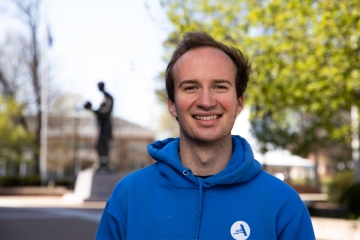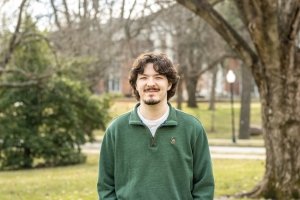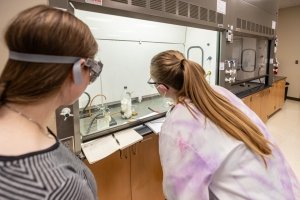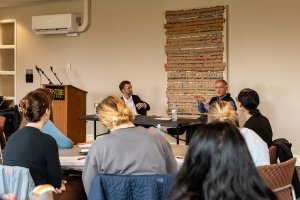Joey Johnson ’23 wins two awards to study Kiswahili
Lincoln Scholar sophomore Joey Johnson’s interest in the East African language of Kiswahili led him to apply for–and win–two scholarships for intensive language study. This summer he will study Kiswahili through the Critical Language Scholarship (CLS) Program, sponsored by the U.S. Department of State. He also received a David L. Boren Scholarship, also sponsored by the U.S. government.
The CLS program is summer study that incorporates intensive language instruction in one of 15 languages considered critical to America’s global engagement as part of an effort to encourage more Americans to study languages important to national security and economic prosperity. This year the program will be conducted virtually.

The Boren Awards also offer international study in languages and cultures considered critical to national security. Johnson’s award, part of the Virtual African Flagship Languages Initiative (AFLI), usually includes a domestic component and a fall spent in Tanzania, but it, too, will be virtual this year. Johnson hopes to apply again at a later date when an in-person opportunity is possible.
“Both CLS and Boren are intensive and immersive language programs (at least in non-pandemic years),” Johnson says. “I wanted to find programs where I could build my language skills from the ground up.”
Robert Schalkoff, director of the Lincoln Scholars Program and the on-campus advisor for CLS and Boren, says, “He’s a natural when it comes to learning languages. So far, he’s studied and gained competency in German and Bulgarian. Recently, he’s been trying his hand at Japanese, and through CLS, he’ll work on Kiswahili this summer. He has a truly global perspective when it comes to languages and cultures.”
With both opportunities available to him, Johnson explains his decision to participate in the CLS program this summer.
“I chose CLS because in-person immersion through the Boren in Tanzania is unfortunately unlikely to happen this year,” he says. “My hope is to build up a foundation of Kiswahili with CLS and re-apply to the Boren in the future when in-person immersion is possible.”
Kiswahili is a key language of trade and culture across East and Central Africa, but Johnson intends to apply his study of the language closer to home.
“Many families I’ve met and worked with both in Kentucky and North Carolina are Kiswahili speakers. Speaking languages that are spoken in students’ homes is vital in terms of providing access to our public education system and in terms of providing more effective English education,” he says. “If many people in the communities I’m a part of speak Kiswahili, that makes it important for me to learn.”
Ian Wilson, associate professor of German and Humanities, says, “Joey gravitates to materials that challenge his intellect but also his ability to empathize with others. He is a generous classmate and an excellent public speaker.”
CLS looks for participants who intend to use the language skills they gain from the program in future careers, and Johnson is no exception.
“Joey Johnson is an excellent student dedicated to long-term goals working to help refugees acquire the skills they need to succeed in their new countries,” says Wilson.
Schalkoff adds, “He’s genuinely concerned about the plight of refugees around the world and has taken concrete steps to support refugees in each of the communities in which he has lived.”
Johnson already has experience working with refugees in Bulgaria and the U.S. A double major in anthropology and sociology, he did a nine-week internship with Kentucky Refugee Ministries this winter.
“I’d like to eventually work at an organization like Kentucky Refugee Ministries, working with clients to help them access English education and public schools in general,” he says.



